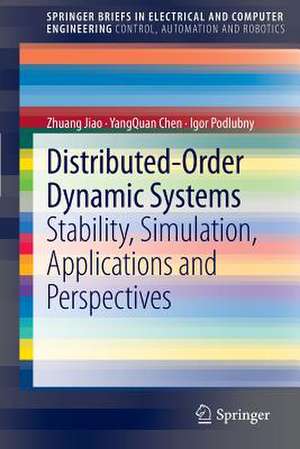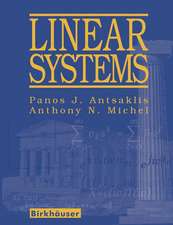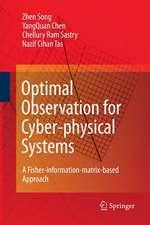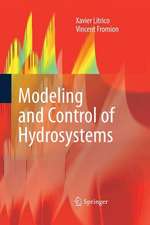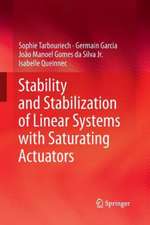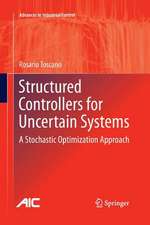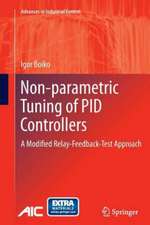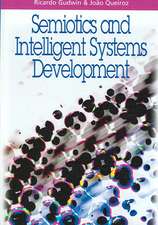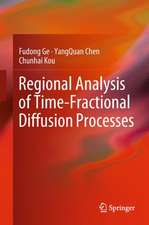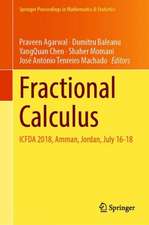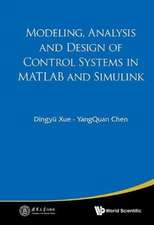Distributed-Order Dynamic Systems: Stability, Simulation, Applications and Perspectives: SpringerBriefs in Electrical and Computer Engineering
Autor Zhuang Jiao, YangQuan Chen, Igor Podlubnyen Limba Engleză Paperback – 26 feb 2012
This Brief will broaden the toolbox available to researchers interested in modeling, analysis, control and filtering. It contains contextual material outlining the progression from integer-order, through fractional-order to distributed-order systems. Stability issues are addressed with graphical and numerical results highlighting the fundamental differences between constant-, integer-, and distributed-order treatments. The power of the distributed-order model is demonstrated with work on the stability of noncommensurate-order linear time-invariant systems. Generic applications of the distributed-order operator follow: signal processing and viscoelastic damping of a mass–spring set up.
A new general approach to discretization of distributed-order derivatives and integrals is described. The Brief is rounded out with a consideration of likely future research and applications and with a number of MATLAB® codes to reduce repetitive coding tasks and encourage new workers in distributed-order systems.
Din seria SpringerBriefs in Electrical and Computer Engineering
- 19%
 Preț: 427.20 lei
Preț: 427.20 lei -
 Preț: 377.35 lei
Preț: 377.35 lei -
 Preț: 380.07 lei
Preț: 380.07 lei -
 Preț: 378.12 lei
Preț: 378.12 lei - 20%
 Preț: 379.08 lei
Preț: 379.08 lei -
 Preț: 377.18 lei
Preț: 377.18 lei - 20%
 Preț: 234.68 lei
Preț: 234.68 lei - 20%
 Preț: 232.43 lei
Preț: 232.43 lei -
 Preț: 378.12 lei
Preț: 378.12 lei - 20%
 Preț: 231.41 lei
Preț: 231.41 lei -
 Preț: 377.18 lei
Preț: 377.18 lei -
 Preț: 377.95 lei
Preț: 377.95 lei -
 Preț: 444.74 lei
Preț: 444.74 lei -
 Preț: 382.36 lei
Preț: 382.36 lei -
 Preț: 378.12 lei
Preț: 378.12 lei -
 Preț: 378.92 lei
Preț: 378.92 lei - 20%
 Preț: 232.43 lei
Preț: 232.43 lei -
 Preț: 376.80 lei
Preț: 376.80 lei -
 Preț: 377.35 lei
Preț: 377.35 lei -
 Preț: 377.18 lei
Preț: 377.18 lei -
 Preț: 381.00 lei
Preț: 381.00 lei -
 Preț: 376.43 lei
Preț: 376.43 lei -
 Preț: 377.18 lei
Preț: 377.18 lei -
 Preț: 378.54 lei
Preț: 378.54 lei - 20%
 Preț: 321.20 lei
Preț: 321.20 lei -
 Preț: 377.73 lei
Preț: 377.73 lei -
 Preț: 341.75 lei
Preț: 341.75 lei -
 Preț: 344.25 lei
Preț: 344.25 lei -
 Preț: 379.09 lei
Preț: 379.09 lei - 20%
 Preț: 324.64 lei
Preț: 324.64 lei -
 Preț: 377.57 lei
Preț: 377.57 lei -
 Preț: 378.71 lei
Preț: 378.71 lei - 20%
 Preț: 321.66 lei
Preț: 321.66 lei - 20%
 Preț: 230.85 lei
Preț: 230.85 lei -
 Preț: 374.30 lei
Preț: 374.30 lei -
 Preț: 375.45 lei
Preț: 375.45 lei -
 Preț: 360.05 lei
Preț: 360.05 lei -
 Preț: 381.43 lei
Preț: 381.43 lei -
 Preț: 378.34 lei
Preț: 378.34 lei -
 Preț: 376.22 lei
Preț: 376.22 lei - 20%
 Preț: 323.99 lei
Preț: 323.99 lei -
 Preț: 380.07 lei
Preț: 380.07 lei -
 Preț: 375.62 lei
Preț: 375.62 lei - 20%
 Preț: 321.20 lei
Preț: 321.20 lei -
 Preț: 377.18 lei
Preț: 377.18 lei - 5%
 Preț: 361.80 lei
Preț: 361.80 lei -
 Preț: 378.12 lei
Preț: 378.12 lei -
 Preț: 375.07 lei
Preț: 375.07 lei -
 Preț: 376.22 lei
Preț: 376.22 lei
Preț: 377.18 lei
Nou
Puncte Express: 566
Preț estimativ în valută:
72.20€ • 78.45$ • 60.68£
72.20€ • 78.45$ • 60.68£
Carte tipărită la comandă
Livrare economică 21 aprilie-05 mai
Preluare comenzi: 021 569.72.76
Specificații
ISBN-13: 9781447128519
ISBN-10: 1447128516
Pagini: 110
Ilustrații: XIII, 90 p. 47 illus., 37 illus. in color.
Dimensiuni: 155 x 235 x 8 mm
Greutate: 0.16 kg
Ediția:2012
Editura: SPRINGER LONDON
Colecția Springer
Seriile SpringerBriefs in Electrical and Computer Engineering, SpringerBriefs in Control, Automation and Robotics
Locul publicării:London, United Kingdom
ISBN-10: 1447128516
Pagini: 110
Ilustrații: XIII, 90 p. 47 illus., 37 illus. in color.
Dimensiuni: 155 x 235 x 8 mm
Greutate: 0.16 kg
Ediția:2012
Editura: SPRINGER LONDON
Colecția Springer
Seriile SpringerBriefs in Electrical and Computer Engineering, SpringerBriefs in Control, Automation and Robotics
Locul publicării:London, United Kingdom
Public țintă
ResearchCuprins
Introduction.- Distributed-order Linear Time-invariant System (DOLTIS) and Its Stability Analysis.- Noncommensurate Constant Orders as Special Cases of Doltis.- Distributed-order Filtering and Distributed-order Optimal Damping.- Numerical Solution of Differential Equations of Distributed Order.- Future Topics.- Appendix: MATLAB® Codes.
Recenzii
From the book reviews:
“This book is a concise introduction to the theory and use of distributed-order systems. … Written at the level of first- or second-year graduate student, the book is well suited as a self-contained introduction to an emerging area of research and applications.” (IEEE Control Systems Magazine, October, 2013)
“This book is a concise introduction to the theory and use of distributed-order systems. … Written at the level of first- or second-year graduate student, the book is well suited as a self-contained introduction to an emerging area of research and applications.” (IEEE Control Systems Magazine, October, 2013)
Notă biografică
Zhuang Jiao is a PhD. candidate of Tsinghua University who worked for 12 months in the Center for Self-Organizing and Intelligent Systems (CSOIS) of Utah State University, directed by Dr YangQuan Chen. During his stay with CSOIS, he served as the Reference Library manager for the Applied Fractional Calculus Group at USU. He is the ever first derived the stability condition for DO LTIS.
Professor Igor Podlubny is a Visiting Professor of CSOIS (Center for Self-Organizing and Intelligent Systems) of Utah State University doing collaborative research with Dr YangQuan Chen in various aspects of applied fractional calculus emphasizing research impacts to the community. Dr Podlubny is one of the leading researchers in the field of fractional calculus. His works are widely and heavily cited. Dr Podlubny serves as an Associate Editor for the flagship journal Fractional Calculus & Applied Analysis. See more at http://people.tuke.sk/igor.podlubny/
Dr. YangQuan Chen is currently an Associate Professor with tenure of electrical engineering at Utah State Univ. and the Director of the Center for Self-Organizing and Intelligent Systems with 30 plus members. Dr. Chen serves as an Associate Editor for Fractional Calculus & Applied Analysis, Fractional Differential Equations, ASME J. of Dynamic Systems, Measurement and Control, IEEE Transactions on Control Systems Technology, IFAC journal Mechatronics and ISA Transactions. He is also a Designated Editor for IFAC journal Control Engineering Practice. His main interests are in applied fractional calculus, systems and control, mechatronics, mobile actuator and sensor networks, UAV-based collaborative personal remote sensing. He has published with Springer two monographs (2010 and 2011) related to applied fractional calculus.
We focus on the stability analysis of distributed-order linear time-invariant system, distributed-order signal processing and the numerical solution to discretization ofdistributed-order derivatives and integrals, and the numerical solution of ordinary and partial differential equations of distributed order. The proposed approach provide a general idea which can help researchers in science and engineering fields solve their issues.
Professor Igor Podlubny is a Visiting Professor of CSOIS (Center for Self-Organizing and Intelligent Systems) of Utah State University doing collaborative research with Dr YangQuan Chen in various aspects of applied fractional calculus emphasizing research impacts to the community. Dr Podlubny is one of the leading researchers in the field of fractional calculus. His works are widely and heavily cited. Dr Podlubny serves as an Associate Editor for the flagship journal Fractional Calculus & Applied Analysis. See more at http://people.tuke.sk/igor.podlubny/
Dr. YangQuan Chen is currently an Associate Professor with tenure of electrical engineering at Utah State Univ. and the Director of the Center for Self-Organizing and Intelligent Systems with 30 plus members. Dr. Chen serves as an Associate Editor for Fractional Calculus & Applied Analysis, Fractional Differential Equations, ASME J. of Dynamic Systems, Measurement and Control, IEEE Transactions on Control Systems Technology, IFAC journal Mechatronics and ISA Transactions. He is also a Designated Editor for IFAC journal Control Engineering Practice. His main interests are in applied fractional calculus, systems and control, mechatronics, mobile actuator and sensor networks, UAV-based collaborative personal remote sensing. He has published with Springer two monographs (2010 and 2011) related to applied fractional calculus.
We focus on the stability analysis of distributed-order linear time-invariant system, distributed-order signal processing and the numerical solution to discretization ofdistributed-order derivatives and integrals, and the numerical solution of ordinary and partial differential equations of distributed order. The proposed approach provide a general idea which can help researchers in science and engineering fields solve their issues.
Textul de pe ultima copertă
Distributed-order differential equations, a generalization of fractional calculus, are of increasing importance in many fields of science and engineering from the behaviour of complex dielectric media to the modelling of nonlinear systems.
This Brief will broaden the toolbox available to researchers interested in modeling, analysis, control and filtering. It contains contextual material outlining the progression from integer-order, through fractional-order to distributed-order systems. Stability issues are addressed with graphical and numerical results highlighting the fundamental differences between constant-, integer-, and distributed-order treatments. The power of the distributed-order model is demonstrated with work on the stability of noncommensurate-order linear time-invariant systems. Generic applications of the distributed-order operator follow: signal processing and viscoelastic damping of a mass–spring set up.
A new general approach to discretization of distributed-order derivatives and integrals is described. The Brief is rounded out with a consideration of likely future research and applications and with a number of MATLAB® codes to reduce repetitive coding tasks and encourage new workers in distributed-order systems.
This Brief will broaden the toolbox available to researchers interested in modeling, analysis, control and filtering. It contains contextual material outlining the progression from integer-order, through fractional-order to distributed-order systems. Stability issues are addressed with graphical and numerical results highlighting the fundamental differences between constant-, integer-, and distributed-order treatments. The power of the distributed-order model is demonstrated with work on the stability of noncommensurate-order linear time-invariant systems. Generic applications of the distributed-order operator follow: signal processing and viscoelastic damping of a mass–spring set up.
A new general approach to discretization of distributed-order derivatives and integrals is described. The Brief is rounded out with a consideration of likely future research and applications and with a number of MATLAB® codes to reduce repetitive coding tasks and encourage new workers in distributed-order systems.
Caracteristici
Shows the reader original results in stability analysis of linear time-invariant systems connected with distributed-order dynamic systems Provides the reader with a general approach to the use of distributed-order operators for use in a number of scientific and engineering disciplines MATLAB® codes expedite the repetitive coding of the examples in the Brief allowing the new user to get started quickly Includes supplementary material: sn.pub/extras
